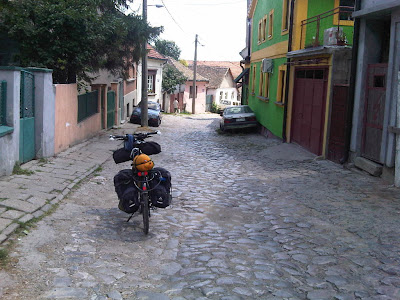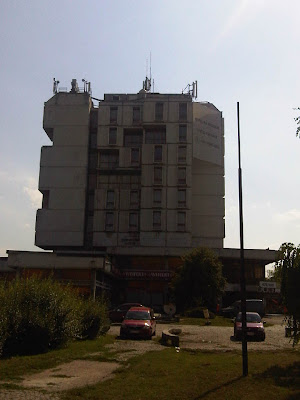Dietmar headed out and I stayed for a while with the family, sitting in the sun and enjoying the breakfast and the coffee. It was so nice there that I could have stayed a week. Eventually I headed out to waves and cheers of take care and be safe. The ride to Belgrad was long and not very pleasant. Near a campsite I stopped to talk with three men from Luzern who were taking a break on their kayak tour from Ulm to the Black Sea. That is also a tour I would like to do. They gave me their contact info and I will write to them soon and ask for some photos of what must be a great adventure.
 Just before Belgrad I passed through the bordering town of Zemun, which is quite run down but has a nice, traditional, small-town feeling to it. There are many cafes and restaurants and today there is a market with many people selling clothing and small articles.
Just before Belgrad I passed through the bordering town of Zemun, which is quite run down but has a nice, traditional, small-town feeling to it. There are many cafes and restaurants and today there is a market with many people selling clothing and small articles.  Crossing the river Sava I enter Belgrad and walk my bike through the town. It is hot and loud and not really anything special. Of course there are a few nice areas but for the most part nothing special. The NATO attacks of 1999 are still a hot issue here and rightly so.
Crossing the river Sava I enter Belgrad and walk my bike through the town. It is hot and loud and not really anything special. Of course there are a few nice areas but for the most part nothing special. The NATO attacks of 1999 are still a hot issue here and rightly so.On a few occasions I was sure that at some point under Tito's regime there was some kind of competition for the ugliest architecture.
Within an hour I was exiting the city and glad for it. Leaving the city I had to go cross the bridge, Pancevo Most, which is a major thoroughfare and the traffic was terrible and loud and the footpath along the motorway very narrow. Anyway, I managed to cross intact and then came off onto a bike trail that was marked and took me along the top of a dam running alongside the river. It was a gravel and grass route and the going was slow, but it was better than being in the city and in traffic.
The rest of that day was wonderful riding on well-surfaced roads with little traffic. I visited the towns of Vojlovica, Omoljica and Pancevo, where I talked with a man on the street who asked me my opinion of Serbia. I told him how surprised I was by the country, the people, the friendliness, etc. He told me that there is a conspiracy by Jews, Free Masons and the united states to spread negative propaganda in the world about Serbia. I had no comment. Could be true.
 In the early evening I arrived in the town of Ivanovo. The sign at the entrance to the town has the name written in Serbian and in Hungarian, which is a language I had not seen for several days and was not expecting to encounter again. Once in the center of town I stopped before a garden in which two people were standing, and asked for water. The woman could speak only Hungarian and Serbian, but Peter also spoke perfect German. We talked for a while in the garden about the town and its history and my travels. Peter suggested that I should stay in the town that night and offered me his house for the night.
In the early evening I arrived in the town of Ivanovo. The sign at the entrance to the town has the name written in Serbian and in Hungarian, which is a language I had not seen for several days and was not expecting to encounter again. Once in the center of town I stopped before a garden in which two people were standing, and asked for water. The woman could speak only Hungarian and Serbian, but Peter also spoke perfect German. We talked for a while in the garden about the town and its history and my travels. Peter suggested that I should stay in the town that night and offered me his house for the night.  He grabbed his bicycle and we rode around the town a little and then rode over to his house. He was staying in another house with his female friend and his house was free. The houses was small, very simple and wonderfully cool inside. In the garden there was a well and I could wash and get fresh water and the trees were bursting full of ripe plums. There is no electricity in the house and when I asked if there were somewhere that I could charge my mobile phone, Peter set about to find a solution. I did not want to cause and chaos, but he insisted. He found a long extension cord and ran it over to the neighbor's house. The neighbours then asked him in Magyar about me and he explained that I was riding my bike to the Ukraine. This set off a big discussion about why, how I arrived there, etc. Thus I was invited over there also. First Peter and I sat in the house, talked and sampled some of the various types of schnapps he had on hand.
He grabbed his bicycle and we rode around the town a little and then rode over to his house. He was staying in another house with his female friend and his house was free. The houses was small, very simple and wonderfully cool inside. In the garden there was a well and I could wash and get fresh water and the trees were bursting full of ripe plums. There is no electricity in the house and when I asked if there were somewhere that I could charge my mobile phone, Peter set about to find a solution. I did not want to cause and chaos, but he insisted. He found a long extension cord and ran it over to the neighbor's house. The neighbours then asked him in Magyar about me and he explained that I was riding my bike to the Ukraine. This set off a big discussion about why, how I arrived there, etc. Thus I was invited over there also. First Peter and I sat in the house, talked and sampled some of the various types of schnapps he had on hand. This town was founded in 1882 when the Austrian empire encouraged Magyars from Hargita and Transylvania, in what is today Romania, to relocate and thus create a stronger presence at the southern border of the empire. They arrived there an laid out a town on a grid pattern with church at the center, wide roads and houses with large gardens. The town was traditionally made up of one third Hungarians, one third Bulgarians and one third Germans. After the second war the Germans left and Serbs from Belgrade moved in. Today the town is still predominantly Hungarian-speaking and Peter and his brother, for example did not learn Serbian until the 5th class in school.
He, and later his brother Gaspar, who I met the next day, are what I consider classic Austria-Hungary descendents. They are Hungarians, live in Serbia, are very intelligent and cultured and both speak perfect German. We had a very interesting conversation and when he had to leave for the evening we agreed to meet for coffee early in the morning. I walked next door to meet the neighbours. We drank a beer together in their garden and then they offered me their bathroom to shower, which was most needed. Later I walked around the village and stopped at the mini-market, which also serves as the town bar and meeting point. I bought a beer, sat on the bench and observed the happenings. Sitting next to me, quite affected by alcohol, was a man about 35 years of age, who turned out to be the town priest. I did not know that priests are permitted to drink. In any case, he was friendly and having a good time with the townspeople. Peter rode by to say how I was getting on and we then sat in his garden and talked.
 Next morning Peter came over at 630 and brought breakfast of Börek, a cheese pie that was clearly introduced during Turkish occupation. Delicious, heavy and perfect accompaniment to palinca, which we were tasting again at 7 in the morning. Gaspar stopped over to say hello and then we rode bikes over to his house, picked fruits from the garden and sampled some of his home-made schnapps.
Next morning Peter came over at 630 and brought breakfast of Börek, a cheese pie that was clearly introduced during Turkish occupation. Delicious, heavy and perfect accompaniment to palinca, which we were tasting again at 7 in the morning. Gaspar stopped over to say hello and then we rode bikes over to his house, picked fruits from the garden and sampled some of his home-made schnapps. It had been a great stay and I like that peace and quiet and friendliness of that town very much.










No comments:
Post a Comment